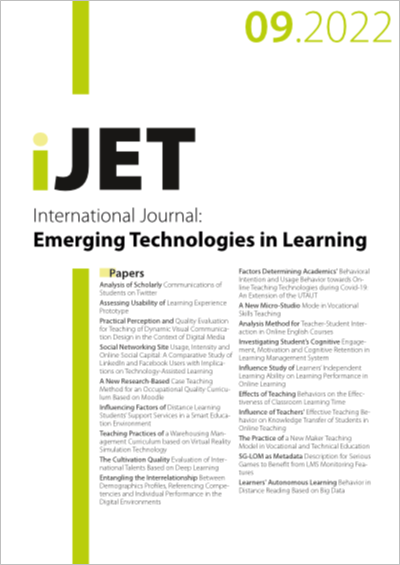The Cultivation Quality Evaluation of International Talents Based on Deep Learning
DOI:
https://doi.org/10.3991/ijet.v17i09.31375Keywords:
deep learning, international talents, cultivation quality evaluationAbstract
The average quality of Chinese talents, especially international talents, is falling behind the international level. For the introduction of high-level international talents, the evaluation of the cultivation quality of high-level international talents is an important factor, and this work is a basis of the said matter. However, most of the existing works related to this topic are just about the definitions of high-level international talents, their features, and importance, or discussions of other aspects. This paper aims to study the evaluation of the cultivation quality of international talents based on deep learning. At first, the paper gave a framework for the ideas of international talent cultivation, established an Evaluation Index System (EIS) containing 4 basic elements for such evaluation, and emphasized the importance of the training and testing of professional business English. At first, the paper gave a framework for the ideas of international talent cultivation, and established an Evaluation Index System (EIS) containing 4 basic elements for such evaluation. Then, this paper proposed the evaluation flow, and adopted an Empirical Mode Decomposition (EMD) algorithm to the analysis of the quality change during the cultivation process of international talents. After that, for the change trend of the cultivation quality of international talents at different time scales, this paper applied a Long Short Term Memory (LSTM) network for training and obtained the corresponding predicted quality value. At last, experimental results verified the effectiveness of the proposed model in predicting the cultivation quality evaluation of international talents.
Downloads
Published
How to Cite
Issue
Section
License
Copyright (c) 2022 Nan Zhang (Submitter); Xiaojuan Jia, Mo Li, Juan Zhao

This work is licensed under a Creative Commons Attribution 4.0 International License.


